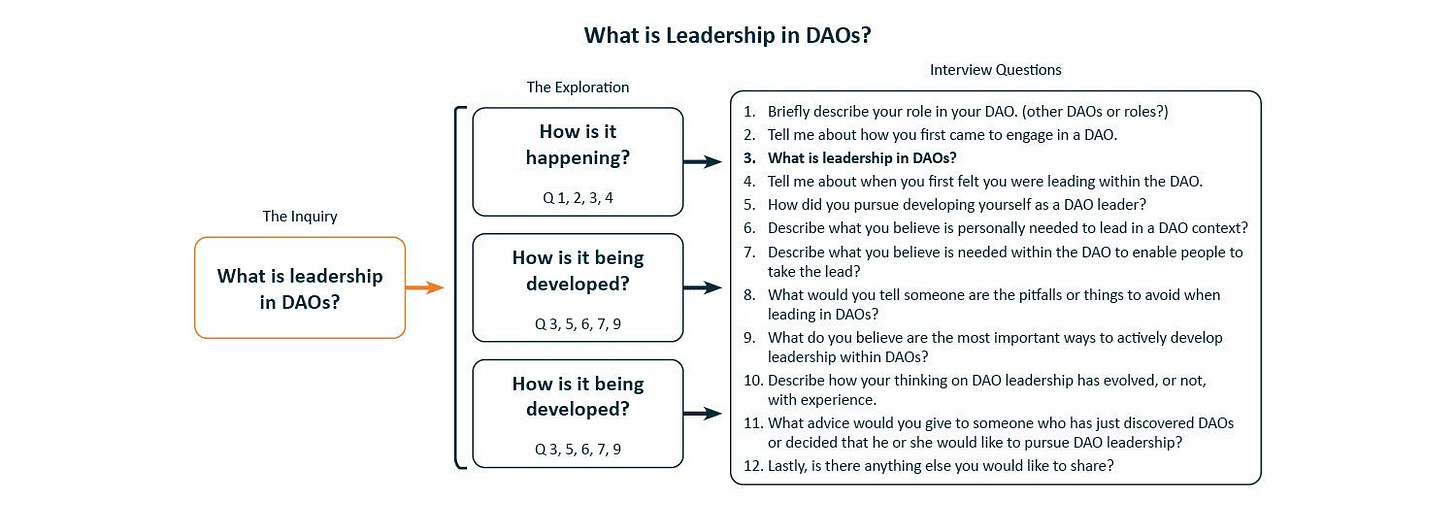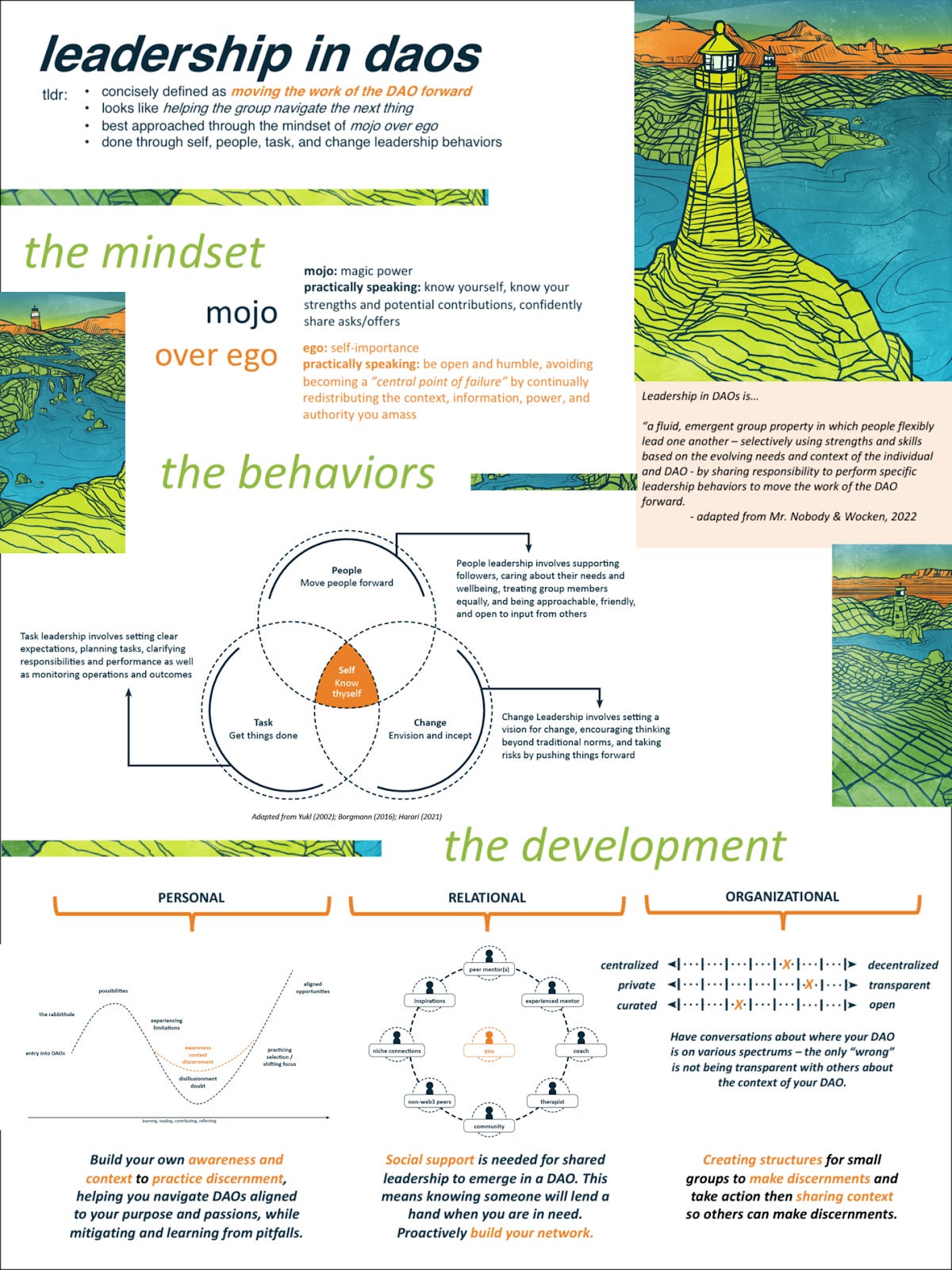In this edition:
Our feature article: Qualitative Insights from 23 DAO Leaders
Elsewhere in Web3
Bonus Morsels
Qualitative Insights from 23 DAO Leaders
by: Lisa Wocken and Francisco Diaz
cover art by: Peter Wocken
What is leadership in DAOs? 23 qualitative interviews were conducted to explore this question. Read the full length report for more details on the study context and methodological approach.
We asked the following interview questions:
The participants (some using pseudonyms) in the study represented experiences at the following DAOs:
MakerDAO, MolochDAO, RaidGuild, MetaCartel, DAOHaus, BANKLESS, GitcoinDAO, Yearn, SuperUMAns, UMA, Bright Moments DAO, ApeSwap, Giveth, Aragon, The Commons Stack, Meta Gamma Delta, ConstitutionDAO, Seed Club, Crypto Sapiens, AndinoDAO, Cabin, Blu3 DAO, Token Engineering Commons, RnDAO, LabDAO, MirrorDAO, Lobby3 DAO, NewAtlantisDAO, talentDAO, Coordinape, MoonDAO, Wonderverse, DreamDAO, and PolygonDAO
Q1: Briefly describe your role in your DAO.
“DAO roles are liquid.” - Charlotte, People Ops Guild
The overarching description was on forwarding the purpose, like "I do what the DAO needs me to do to keep pushing forward” or "Making sure the DAO keeps moving". Other accountabilities shared:
Q2: Tell me about how you first came to engage in a DAO.
Actions like “Joining a Discord”, “cruising Twitter”, “investing in blockchain” were often connected to going “down the rabbithole”.
Others cited proto-DAOs, like cooperatives, start-ups, open-source development communities, anarchist movements, organized religions, and social clubs.
Q3: what is leadership in DAOs?
The entire study was designed around this question, of which we asked directly to each participant.
Responses included:
“providing courage and clarity” – Rafa, Mirror
“stepping up to do what they are excellent or world class at that provides a lot of value for the DAO." – Cynthia, Blu3DAO & Dtravel
“enabling work teams to be autonomous and productive” – Renee, talentDAO
“actually about eliminating the dependency on you.” – Ashley, UMA
"helping the group navigate what the next thing is" - Jon, Cabin
“not created by position or pay, but rather time, reputation and people's willingness to value your opinions." - Justice, BANKLESS
Q4: Tell me about when you first felt you were leading within the DAO.
The response to this question was rarely articulated as having obtained a title or a certain position, rather participants offered responses like:
not a "specific moment" – Grendel, PolygonDAO
"When people trusted me to make sound decisions" – Humpty, Crypto Sapiens
"I was leading when I stopped thinking I was dumb" – Livia, Token Engineering Commons
Other moments were when they started advocating, organizing work, generating results, getting questions and DMs.
Q5: How did you pursue developing yourself as a DAO leader?
“I pursue developing myself. And as a consequence, that impacts everything.” - Daniel, RnDAO
The learning and unlearning journeys are different for each person. Responses included:
"First, I understood the web3 culture" – Marc, AndinoDAO
"I didn't do much preparation. I just had to go for it and learn from my faults.” – Apeguru, ApeSwap
“forcing myself to be uncomfortable” – Renee, talentDAO
"communication, listening, being strategic" – Kina, MakerDAO
Q6: Describe what you believe is personally needed to lead in a DAO context.
“clarity, and empathy and trust.” – Nina
"They have to be ok with chaos and disorganization...or even thrive in it.” - Cynthia, Blu3DAO & Dtravel
"Understand that your role is not to create an army of supporters" – Rafa, Mirror
Responses also included being assertive, humble, curious, kind, resilient, driven, taking initiative, and having a bias for action, along with setting aside ego and having a positive-sum and open mindset.
Q7: Describe what you believe is needed within the DAO to enable people to take the lead?
Emphasizing decentralization and transparency in the space, many shared Kina’s perspective that we need to enable anyone to "see the big picture and then be able to execute in a small way as well.”
Many expressed concerns about being too “DAO-y” or that the DAO ethos itself could present a hurdle of stalling out decision-making, ineffectively distributing funds, not having clear accountabilities or revenue models.
Q8: What do you believe are the most important ways to actively develop leadership within DAOs?
Repeated micro exposures to something to create a sense of familiarity” – Daniel, RnDAO
Develop your personal leadership by learning about yourself, your personal purpose, and your strengths. Upskill and proceed with the belief that, "Everyone can teach everyone".
Q9: What would you tell someone are the pitfalls or things to avoid when leading in DAOs?
"A huge pitfall is when organizations lack leadership." – Kina, MakerDAO
DAOs have roots in “putting humans at the edges” and yet this narrative can make it easy to ignore addressing some very human issues, like burnout, exploitation of workers, core teams becoming power blocks, lack of diversity, and risks of people’s everything being available to the wrong people.
Q10: Describe how your thinking on DAO leadership has evolved, or not, with experience.
"It evolves every day, because web3 is so ever-changing. What you think is the right way to do things changes so quickly." – Cynthia, Blu3DAO & Dtravel
Many disclosed wanting and needing more leadership in the space, “leader is not a bad word” to ensure we challenge and grow and move our DAOs forward.
Many expressed belief that DAOs still hold the best potential for creating a “global governance layer” where other institutions and attempts have clearly fallen short - we are just not there yet.
Q11: What advice would you give someone who would like to pursue DAO leadership?
“You have to have both the skillset and the desire to continually decentralize the work that you’re doing.” - Leela, DreamDAO
This is a highly experimental space and learning through mistakes is an imperative part of leading in DAOs.
In conlusion, people within DAOs feel deep gratitude to be in this space. There is a sense of building the future, while simultaneously building the person. For an infographic summary see below. Please check out the long form Mirror article for additional details.
Elsewhere in Web3
Disambiguating Autonomy / Blockscience
The term 'autonomy' is often used to refer to the freedom an individual or organization has from external influence or control. It is a multifaceted concept that can be divided into two categories: functional and political autonomy. Functional autonomy refers to an organization's ability to respond to complexity in its internal operations, while political autonomy relates to an individual or organization's freedom from external political influence. Michael Zargham's talk on 'Disambiguating Autonomy' aims to clarify the concept by breaking it down into these categories and further into strategic and tactical autonomy. A decentralized autonomous organization (DAO) exercises collective autonomy, meaning it has the freedom to make decisions about how the group will act, and strategic autonomy, which is the ability to set primary goals, performance metrics, KPIs, and policy-making. Autonomy is a relational concept, and relationships within the same scale are easier to reason about.
Current token designs for protocols grant the same form of ownership to all stakeholders, regardless of their role or value contribution. This approach is potentially inefficient and limits sustained user involvement over time. One solution to this is to explore a hybrid token model that assigns different forms of ownership based on the value contributed by users, founders, and investors uniquely. A hybrid model will allow for more efficient use of protocol capital and ensure that ownership rights can be given to users in perpetuity. Shough.eth from Variant proposes a token design that grants appreciating tokens in perpetuity to stakeholders where there is high assurance about the long-term value they are providing.
World's first DAO / Alex Stein
Is Wikipedia the First DAO? The author presents a strong argument that it just might be. Wikipedia's success in gathering a community around collective sense-making shows that humans have an inherent desire to work together and create value, and that coordination is the most important design space that exists.
Games over Governance / 0xJustice
DAOs are often focused on governance, but this approach can be a recipe for failure as governance and automation are inversely correlated. Instead, the strength of DAOs lies in coordination, and they can be decentralized economic game engines that create order from chaos. To achieve maximum coordination effectiveness, DAOs must be structured as multiplayer games, reward outcomes rather than activity, build in growth and self-replication, and minimize governance through parameterization. By centering on coordination, DAOs can unlock new possibilities and gain compounding returns by designing testable and reusable game elements. Coordination should be at the center of DAO design, and governance should only be added as needed. DAOs can be a form of digital life that sustains their own life and encourages beneficial replication. What kind of innovative coordination games could be developed within the DAO ecosystem?
Auditing the Social Layer of a DAO / Samantha Marin
Samantha starts an important conversation that many DAOs are too uncomfortable to have but inevitably must be addressed: How do we audit the social layer? DAOs who have yet to codify rules as code are often less trustworthy because of the ease in social attacks, and attackers often attempt to exploit social vulnerabilities first. At talentDAO we believe good organizational science will de-risk DAOs and psychometrics will be the blueprint for layer zero contract audits to reduce social engineering exploits.
Bonus morsels
Summary on Protocol First Strategy / Rika
Rika’s thoughtful response to the Protocol First strategy written by 0xJustice further enriches the conversation on potential blueprints for DAOs. To truly scale DAOs will need to adopt a platform first, not protocol only approach.
Discourse analysis of 59k posts / Flipside Governance
Discourse generates significant conversation data that can be computationally analyzed to explore broad discursive trends. 4,811 discussion threads from 15 DAOs were analyzed, yielding 59,806 documents that represent members' posts or replies in forums. The data revealed two main areas of discourse: scalability issues and governance participation. Discussions on scalability focus on issues around scalability and scaling solutions, while governance participation looks at concerns regarding delegation and incentivization of governance participation and whether/how delegates should be compensated.
Pairs nicely with the Discourse NLP research being done by community members at TalentDAO
What are Ghost Delegates / Karma
Karma analyzed delegation activity of a few large DAOs over the course of Q3/Q4 of 2022 and found that Ghost Delegates make up on avg. 53% of all delegates. Ghost Delegates are delegates that never voted even once:( Read the thread for more details.












good
good